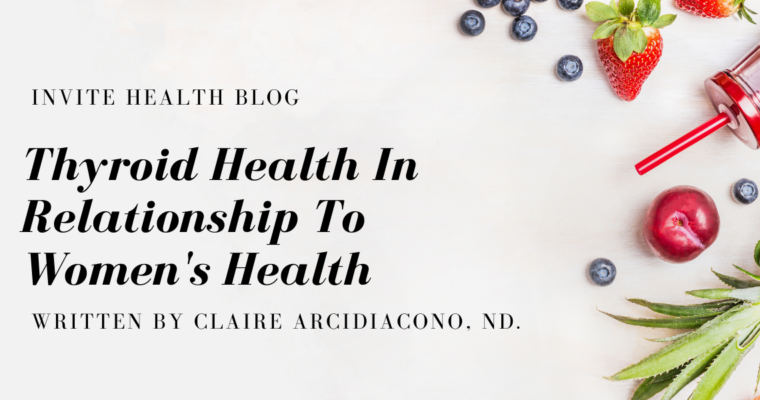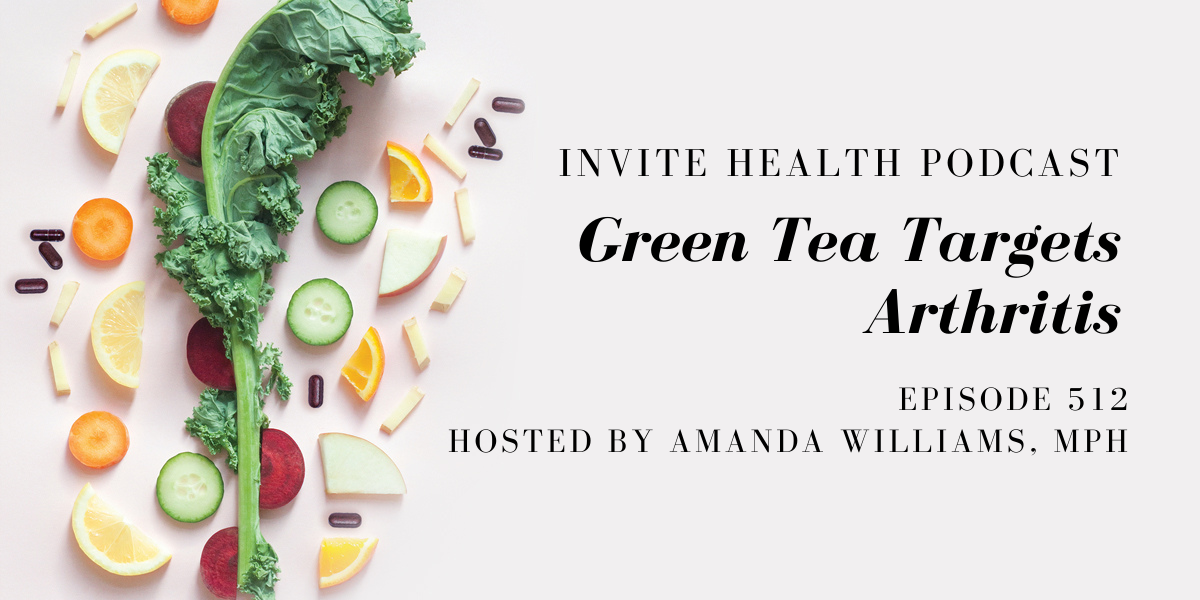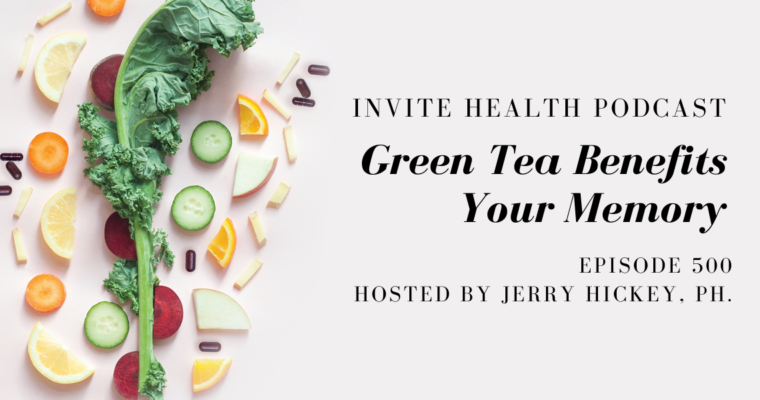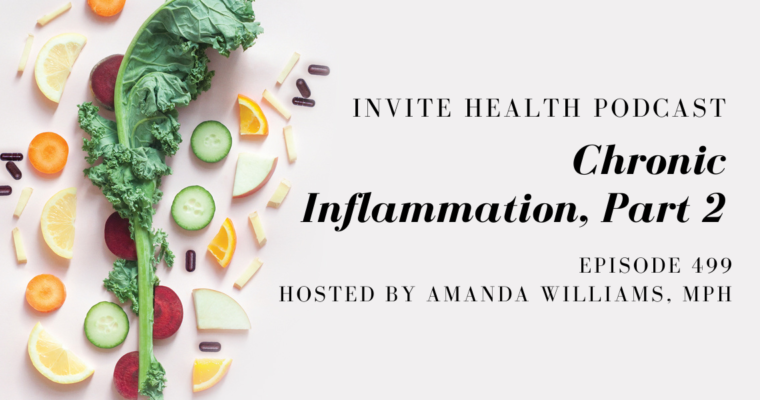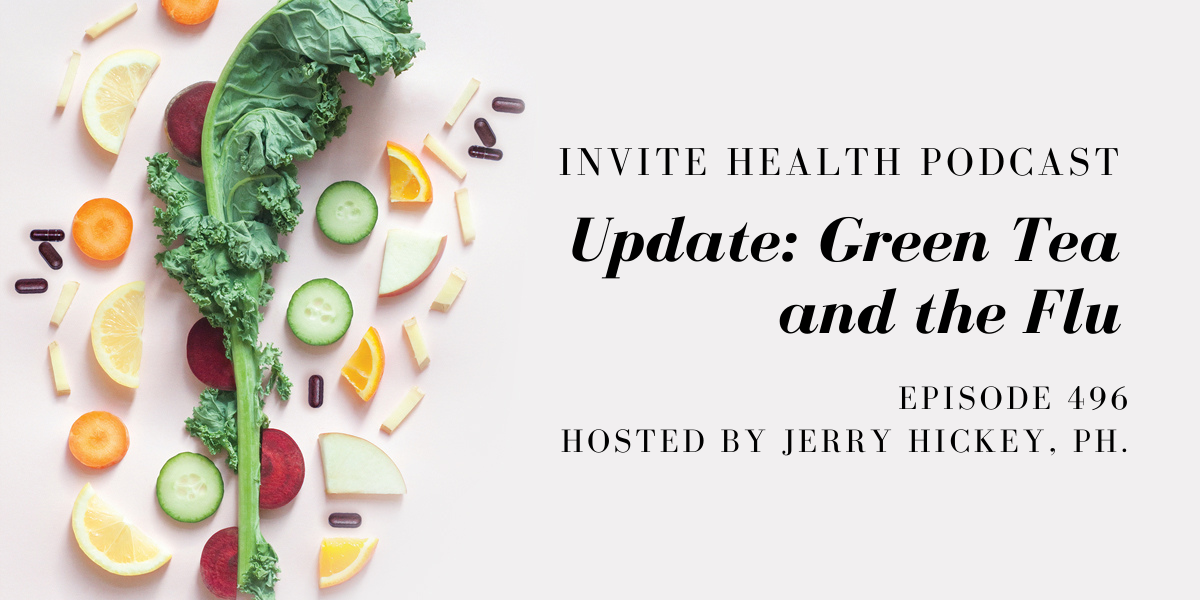flu
Subscribe Today!
Please see below for a complete transcript of this episode.
Update: Green Tea and the Flu – InViteⓇ Health Podcast, Episode 496
Hosted by Jerry Hickey, Ph.
*Intro music*
InVite Health Podcast Intro: Welcome to the InViteⓇ Health Podcast, where our degreed healthcare professionals are excited to offer you the most important health and wellness information you need to make informed choices about your health. You can learn more about the products discussed in each of these episodes and all that InViteⓇ Health has to offer at www.invitehealth.com/podcast. First time customers can use promo code PODCAST at checkout for an additional 15% off your first purchase. Let’s get started!
*Intro music*
Jerry Hickey, Ph.:
[00:00:40] There’s an awful lot of research that green tea helps fight viruses. If you go into PubMed, the Library of Congress website that collates studies, and you type in “green tea” and the word “virus”, you’ll see many, many, many studies coming up. And right now we’re in flu season and we’re also in COVID-19 season. So can green tea help you with these? The answer seems to be, quite frankly, yes.† [00:01:11]
[00:01:13] So green tea is loaded with specific ingredients. There’re types of polyphenols. Now there’s thousands of polyphenols. For instance, the polyphenols in milk thistle are good for the liver and the kidneys. The polyphenols in grape seed extract are great for the heart and circulation. The polyphenols in resveratrol are great for the brain. Well, the polyphenols in green tea do many things. That’s because there are so many of them. There’s about 20 that we know of at this point. But the ones most involved with viruses are EGCG, also called Epigallocatechin gallate, and EGC, which is Epigallocatechin. So these are polyphenols and other polyphenols that are further broken down to flavanols, which there’s also thousands of, and from flavanols, they’re broken down to catechins. So the ingredients in green tea that are great for viruses are called catechins. So there’s different studies available that green tea may help slow down the Zika virus, that green tea might slow down particular hepatitis viruses that green tea slows down chikungunya virus. But there’s a lot of research that green tea slows down influenza, and it seems to be for all of the strains of the flu virus.† [00:02:39]
[00:02:43] So welcome to our episode, Update on Green Tea and the Flu. Hi, my name is Jerry Hickey. I’m a nutritional pharmacist. I’m also the Senior Scientific Officer over here, @invitehealth. You can find all of our episodes for free wherever you listen to podcasts or visit invitehealth.com/podcast. You can also follow us on Twitter, Instagram and Facebook @invitehealth. All of the information on today’s episode is linked at the episode description.† [00:03:13]
[00:03:14] So let’s just quickly in my brain review the studies on green tea and the flu. There is many studies out of Japan because, of course, Japan is famous for growing green tea, so they’re going to do research on green tea. Now, the health authorities in Japan tell people to gargle with water several times a day to lower their risk of the flu, and it actually works. Even just rinsing your mouth out with water several times a day reduces your risk of the flu. But if the children rinse their mouth with green tea, it very powerfully reduced their risk of the flu, we’re talking like a 65% reduction in the risk of having a diagnosis by a pediatrician for the flu in a child. There’s also studies in several precincts of Japan, where they have green tea plantations, and the children there tend to drink these tiny cups of green tea. And they found that there was a dose-response relationship, meaning the more green tea to a point, the lower their risk of having a sore throat and flu-like symptoms. And they found that the children who had up to five tiny little cups a day, had a much lower risk of developing fevers and sore throats and coughs, etc., symptoms related to flu and cold.† [00:04:33]
GREEN TEA AND LONGEVITY – INVITE HEALTH PODCAST, EPISODE 336. Listen Now>>
[00:04:35] Now, the University of Florida, Gainesville did a study, you know, the Gators, Gatorade. In any event, they did a study in American adults over a winter, and they gave them concentrated green tea capsules. And they found that far fewer of them developed the symptoms of the flu. Far fewer of them got sick. But for those who did get sick, they got better, a lot faster and their symptoms were much milder. So on one hand, it was lowering the risk of getting the flu. And on the other hand, if you did get it, it was like a weak infection. It didn’t mean as much as it could have. There’s a study in New York in healthcare professionals. They gave them green tea capsules, plus an element that comes out of green tea called L-theanine. And the incidence of colds and flu infections over the winter dropped dramatically in 200 healthcare professionals. There’s also research that green tea lowers the risk of getting infections in people in assisted living homes, what we used to call nursing homes. People are in assisted living homes for a reason. Maybe they had a stroke. Maybe they have a touch of Alzheimer’s. Maybe they had broken hips, but for some reason they’re weakened. They can’t take care of themselves anymore. Maybe they’re just extremely old and fragile. In any event, they get immunized for the flu, but it doesn’t mean that much because their immune system is getting old and not as functional anymore, so they don’t make enough antibodies to the flu. So these were a whole group of people in assisted living homes who were immunized for the flu. If they gave them green tea after that, it further cut down on the risk of the flu by about 75% because they could still get the flu because, like I said, their immune system is becoming slowed down and weakened and compromised, and that’s just not working effectively, even if they get immunized. So there is a lot of studies. In fact, there was this other study from Japan. Older women that supped a lot of green tea had a much lower risk of dying from pneumonia. So there’s a lot of data looking at green tea and the flu.† [00:06:56] [00:07:00] So this is a very recent review and a meta analysis. They went through all of these web sites that collate research and hunted for new research on green tea and influenza, green tea and the flu. It’s from the Biological Science Research Labs in Tokyo, Japan, and the Graduate School of Pharmaceutical Sciences, Shizuka University in Japan. They do a lot of great research there. It’s an, it’s published in the European Journal of Nutrition. So they’re looking for studies specific to green tea and the flu. And they found six randomized, placebo-controlled human clinical trials and four prospective cohort studies. Prospective cohort studies are very interesting to me. They get a large population of people. So maybe they’ll get 30,000 people in Seattle, Washington, and then they’ll look at all of their health data and the way they eat and do they take vitamins and do they have any illnesses, and they follow them for years and you get a huge amount of data out of that. You could get data on, you know, what increases your risk of diabetes or what increases the risk of breast cancer or prostate cancer. So they, they, they really data mine for all these different things because if you look at 30, 40,000 people, you could get a lot of data out of it. So in this case, there were four of those studies, four huge population based cohort studies, looking does green tea lower the risk of of viruses and the flu? And six randomized, placebo-controlled human clinical trials, which are gold standard state of the art studies. And they found that green tea catechins, that’s the EGCG and the EGC, those two especially, inhibit the spread of viruses by creating a protective sort of barrier in your pharynx. So what’s your pharynx? In the back of your mouth, your throat bends down to your esophagus. The esophagus is the tube from your throat down to your stomach. That bend is called a pharynx. So apparently drinking green tea kind of stops the viruses from getting past the pharynx. Well, that’s a good thing. And they also found in all these studies that green tea strongly reduces the risk of upper respiratory tract infections. So what’s the upper respiratory tract? Well, the nose, the mouth, the nasal pharynx, that area, so that could be a sore throat, a cold, stuffy nose. They found that EGCG and EGC, these are two of the primary catechins in green tea, bind to hemagglutinin, the spike of hemagglutinin on the outside of the viral envelope, and neuraminidase. Now that’s really interesting. These are enzymes that the virus uses to cling on to you. So somebody sneezes on you, the virus hits you, it’s got to hold on. It’s got to penetrate into the cell, multiply and spread from cell to cell. And they found that green tea inhibited these enzymes. In other words, green tea was preventing influenza. They’re looking at influenza. And the more green tea you consume, the better you’re protected. So once again, there’s a dose response. One cup of green tea is protective. Two cups, two cups of green tea a day, not at the same time, are more protective, and three cups is even better. So the more green tea you consume, the better you’re protected from all flu strains, all flu strains.† [00:10:46]
[00:07:00] So this is a very recent review and a meta analysis. They went through all of these web sites that collate research and hunted for new research on green tea and influenza, green tea and the flu. It’s from the Biological Science Research Labs in Tokyo, Japan, and the Graduate School of Pharmaceutical Sciences, Shizuka University in Japan. They do a lot of great research there. It’s an, it’s published in the European Journal of Nutrition. So they’re looking for studies specific to green tea and the flu. And they found six randomized, placebo-controlled human clinical trials and four prospective cohort studies. Prospective cohort studies are very interesting to me. They get a large population of people. So maybe they’ll get 30,000 people in Seattle, Washington, and then they’ll look at all of their health data and the way they eat and do they take vitamins and do they have any illnesses, and they follow them for years and you get a huge amount of data out of that. You could get data on, you know, what increases your risk of diabetes or what increases the risk of breast cancer or prostate cancer. So they, they, they really data mine for all these different things because if you look at 30, 40,000 people, you could get a lot of data out of it. So in this case, there were four of those studies, four huge population based cohort studies, looking does green tea lower the risk of of viruses and the flu? And six randomized, placebo-controlled human clinical trials, which are gold standard state of the art studies. And they found that green tea catechins, that’s the EGCG and the EGC, those two especially, inhibit the spread of viruses by creating a protective sort of barrier in your pharynx. So what’s your pharynx? In the back of your mouth, your throat bends down to your esophagus. The esophagus is the tube from your throat down to your stomach. That bend is called a pharynx. So apparently drinking green tea kind of stops the viruses from getting past the pharynx. Well, that’s a good thing. And they also found in all these studies that green tea strongly reduces the risk of upper respiratory tract infections. So what’s the upper respiratory tract? Well, the nose, the mouth, the nasal pharynx, that area, so that could be a sore throat, a cold, stuffy nose. They found that EGCG and EGC, these are two of the primary catechins in green tea, bind to hemagglutinin, the spike of hemagglutinin on the outside of the viral envelope, and neuraminidase. Now that’s really interesting. These are enzymes that the virus uses to cling on to you. So somebody sneezes on you, the virus hits you, it’s got to hold on. It’s got to penetrate into the cell, multiply and spread from cell to cell. And they found that green tea inhibited these enzymes. In other words, green tea was preventing influenza. They’re looking at influenza. And the more green tea you consume, the better you’re protected. So once again, there’s a dose response. One cup of green tea is protective. Two cups, two cups of green tea a day, not at the same time, are more protective, and three cups is even better. So the more green tea you consume, the better you’re protected from all flu strains, all flu strains.† [00:10:46]
[00:10:47] So now let’s look at coronavirus. Coronavirus is actually a family of viruses, like there’s a bunch of colds in the United States caused by something like five different strains of coronavirus. But the one we’re concerned with now is the SARS-CoV-2 virus that causes COVID-19. That’s the name of infection, but the virus is actually called SARS-CoV-2. So this is Yonsei University in Korea. That’s a pre-clinical study. A pre-clinical study means it’s not in people. That’s in the journal Viruses. So the first part is in vitro, which means it’s in a dish, it’s not in something living. Green tea blocked the ability of the coronavirus to infect cells by blocking its infectious enzymes like hemagglutinin, like green tea was doing with the flu in the other study. Then they did an in-vivo study. In-vivo means something living, like a rabbit or a hamster or a mouse or a rat. So in this case, it was mice and they infected the poor mice with coronavirus. If they gave them green tea with greater than 60%t catechins, but also rich in EGCG… So if it was just 60% catechins or it was just very powerful EGCG, either one of them blocked coronavirus, it blocked human coronavirus to a very good degree, but it also kept the virus out of the lungs of the mice.† [00:12:22]
[00:12:24] So here’s the Department of Virology, Paul Ehrlich Institute, that’s in Germany, and the German Center for Infection Research. It’s in the Journal of General Virology. And they found that green tea and especially EGCG blocked COVID-19. It was blocking the spike protein, it was blocking the ability of COVID-19 to infect you. But here’s the interesting thing. Before COVID-19, years ago, there was MERS. That was in the Middle East like Saudi Arabia, and there was the original SARS virus, the SARS-COVID virus. This is SARS-CoV-2. This is the latest strain. And they found that green tea also inhibited MERS and SARS-COVID, the original viruses.† [00:13:25]
[00:13:27] So here’s the journal Molecules. It’s the Department of Immunology, Kyoto Prefectural University of Medicine and The Central Research Institute, both in Japan. And when they exposed COVID-19 virus to green tea, it reduced the detectable number of virus cells to one one-hundredth. And it killed 99%, on contact, of the COVID-19 virus. It killed 99%. Now, then they went a further step. They took the EGCG, green tea rich in EGCG, that’s the major polyphenol. That’s the one that’s looked at for prostate cancer and breast cancer and colon cancer and aging and muscle health and brain health, et cetera. They took green tea very rich in EGCG, and they also added some black tea to theaflavins. This is what we did in our Green Tea HxⓇ capsule, by the way. This was even stronger against COVID-19. Reduced infectivity have made it harder for the virus to infect the cells. It reduced viral replication, the virus couldn’t spread. The virus couldn’t reproduce, and it also inhibited the spread of virus from cell to cell. There really seems to be something about green tea and viruses.† [00:14:50]
[00:14:52] Now, I just did an update on Vitamin D and COVID-19. And now I’m doing an update on green tea and mostly influenza, but possibly an effect on COVID-19. So why not sip green tea? It’s delicious. It’s healthy. I would do a minimum of three cups a day. I would brew it and let it cool down. Don’t add sugar and don’t add milk to it. Add lemon. It kind of protects the green tea catechins, and you absorb them better, and the more you absorb, the better it is for your health. So I would definitely get my Vitamin D levels higher right now, because there’s a lot of evidence that it keeps you safer from COVID-19. And I would definitely be sipping green tea.† [00:15:37]
COVID-19 RESEARCH RECOMMENDS VITAMIN D SUPPLEMENTATION – INVITE HEALTH PODCAST, EPISODE 251. Listen Now>>
[00:15:39] So thank you for listening to today’s InViteⓇ Health Podcast broadcast, you can find all of our episodes for free wherever you listen to podcasts or just visit invitehealth.com/podcast. You can also follow us on Twitter, Instagram and Facebook at @invitehealth. And by the way, when you listen to our podcast, if you could subscribe and leave us a review, it would be helpful. I want to thank you for listening. I’m signing off, Jerry Hickey. Hope to see you next time on another InViteⓇ Health Podcast episode.† [00:15:39]
*Exit music*


